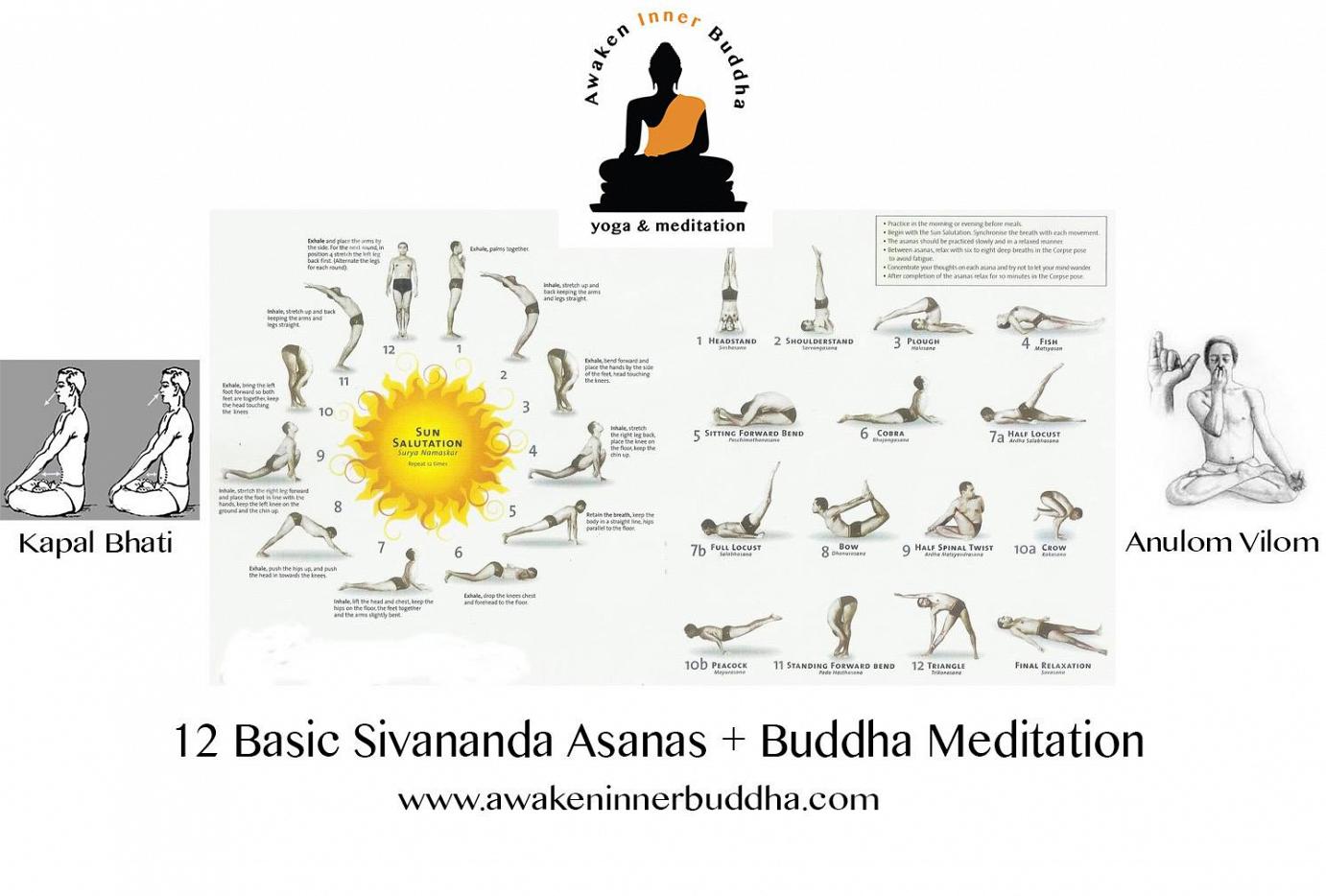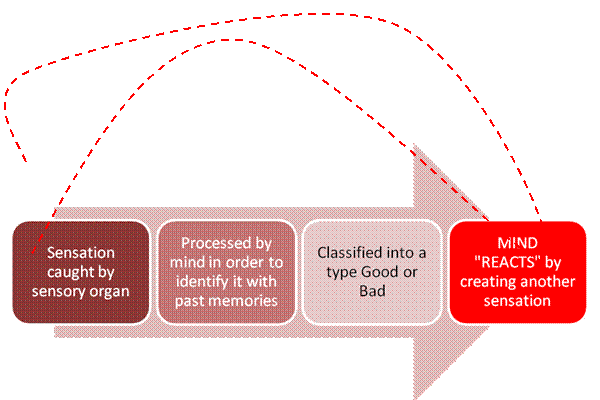 A good sportsperson is not merely recognised for his skill to physically perform, but also have the ability to focus, calculate and react with the presence of his mind in order to win in a competitive sports environment. A sportsperson depressed or stressed does not perform quite at the same level as the one who is mentally happy and healthy.
A good sportsperson is not merely recognised for his skill to physically perform, but also have the ability to focus, calculate and react with the presence of his mind in order to win in a competitive sports environment. A sportsperson depressed or stressed does not perform quite at the same level as the one who is mentally happy and healthy.
The Yogis for thousands of years have understood the power of mind and creation. The mind is a powerful projector and a center of activity which has multiple functions to perform simultaneously. Broadly speaking it performs
- Recognition and cognitive functions – It differentiates between objects, colours, smell, sounds, images, sensations based on the data bank that it creates in a space called the memory bank. Every time a sensation occurs in form of sound, smell, touch, vision taste or even thought, the sensation is processed in the following manner. It is to be understood clearly that even a THOUGHT is a sensation.

In the above diagram it can be easily understood how one sensation that is processed and classified by the brain, COMES – RISES – GET CLASSIFIED into a BOX – and as it is passing , we REACT and create another sensation.
If we were to not react, the sensation would COME – RISE – and PASS AWAY, however the reaction leads to another sensation as shown in the diagram above. So one sensation becomes two, 2 sensations become 4 and sometimes this 1 sensation can result into millions of sensations.
- Another function of mind is the ability to distinguish one thing from another, intellectualise.
- Create a memory bank of the thoughts we possess, the experiences we have and emotions we feel and our whole consciousness as it is coming, happening, rising and passing away.
- Control the functions of the body in order to cater to our desire as well as keep the body functioning in balance. Thus the body heats up as the weather cools down and tries to cool itself as the weather is getting hotter. The mind controls functions of stomach, heart, liver and ever possible conceivable nerve and organ we can think of inside the body.
- One of the most important functions of mind – is being a projector. Nobody talks about it yet everyone understands at some spiritual level or subconscious level that there is some connection between WHAT we are thinking and feeling and what is actually happening in our life. A lot of people when faced with anxiety or periods of hardships are reminded by loved ones “Think Positive”. In this function the mind actually creates everything that you feed it , irrespective of whether it is good for your or bad for you and that is why we refer it to as the projector function of the mind. How are we feeling (which is in turn determined by how are we reacting to the sensation outside of us and thought sensations inside of us ) lead to the feed function of this projector and we become truly the creator of our bad or good luck and life as it unfolds.
In all of the above if we were to understand mind as a machine which performs multiple functions and while doing this multi-tasking, we intervene and interrupt this process through REACTION, since REACTION leads to more than the original SENSATION. One sensation becomes two, two becomes many, sometimes millions - it will be clear to us that over creation of sensations – is like OVER USING or EXHAUSTING THE MIND in thinking function continuously which leads it to fail on other functions – thereby the control of the body goes out of balance and so does the memory retention and focus and concentration. When we keep reacting to every sensation, leading to multiple million sensations, we start living in the unreal world of our own sensations, which can lead us to over reacting, multiple emotions caused merely in our mind (independent of our reality) and continuous sadness or excitement none of which has a visible outer origin except for our mind creating it through reaction. This leads the mind to fail in other functions, leading to imbalance of the body functions and then leading to affecting the projector function of the mind whereby mind keeps projecting what we feed to it and mostly we end up feeding it, our fears and things we are most insecure about, leading to more reactions and more UNREAL SENSATIONS that never cease to end.
Also Read: The Science of Yoga: Physical Yoga is only 12.5 % of YOGA
It should also be clear through the above discussion that if we were not learn to REACT LESS or NOT REACT , the mind will be more empty since we would FREE IT OF the FUNCTION OF REACTING AND RECREATING multiple sensations and the analysis of it.
In Nutshell if we chose not to react or chose to react half of the times, we would create less UNREAL SENSATIONS, with less processing happening to analyse them and multiply them and the mind will be able to perform the rest of its functions more efficiently. Buddha preached this skill to not react while observing and called it Vippassna which in Pali language meant to Observe without reaction. In the most powerful meditation which was taught by Buddha himself, we learn the art of observation, first to create a focus or Dharana and then to go deeper into our consciousness known as Dhyana. The technique is called as Vippassna. As the mind learns to observe, it starts releasing the previously held reactions and emotions and traumas and thus releases the body of the pressure of holding so many thought and emotions physically inside. He understood during his enlightenment that REACTION was the root CUSE of all human suffering and thus until his death he kept teaching how to Observe without any reaction and be in observation of one own Breath and Body.
The ability to not react releases our mind and helps in healing problems of OVER ACTIVE MIND, which causes sleeplessness, stress (since body is busy reacting instead of functioning) and it also activates high levels of accelerated healing.
Also Read: Yoga for Sportsperson--Breath Yoga
Through Yoga (asanas) we affect our breath (which is the bridge between the mind and the body) and through the breath we gain control over our mind which is super active all the time and is super busy reacting to this or that. The control of the mind and meditation is what forms 75% of Yoga and thus it leads to better mental health, reduction in stress and negative thoughts and ability to release states of depression which are nothing but prolonged state of over reacting personal consciousness that leads to lack of purpose since we assume we know exactly everything that is going to occur or happen.
Benefits of yoga for mental health
A new review of over 100 studies on the benefits of yoga for mental health has shown that yoga has a positive effect on psychiatric problems, from mild depression and sleep troubles to schizophrenia. The study called “Yoga on our minds: a systematic review of yoga for neuropsychiatric disorders” was published in the journal Frontiers in Psychiatry. The authors found that yoga influences key parts of the body that are thought to play a role in mental health in similar ways to antidepressants and psychotherapy. Scientists at Duke University Medical Center reviewed the findings of previously published research, all of which had looked at the effects of yoga on major psychiatric disorders.
In one study of 69 older adults with mild depression, weekly yoga sessions reduced depression scores by 40 percent at six months. A comparison group of adults who didn’t take yoga, and a group that practiced a form of complementary medicine called Ayurveda, did not show changes in depression scores.
In another study, seven weeks of yoga improved sleep quality and reduced the need for sleep aids in 39 adult cancer patients receiving chemotherapy. People who did not take the yoga sessions (control group) did not have an improvement in sleep.
Yoga practice improved symptoms of both schizophrenia and ADHD in people who were on medication.
One of the study’s authors, Dr Murali Doraiswamy, professor of psychiatry and medicine at Duke, claimed that if yoga’s impact on mental health was available in drug form, ‘it would be the best selling medication world-wide’. He added: ‘The search for improved treatments, including non-drug-based, to meet the holistic needs of patients is of paramount importance and we call for more research into yoga as a global priority.’
At Awaken Inner Buddha we teach the yoga of the mind, all the physical asanas lead into the Breath yoga and all the breath work leads us into learning how to go deeper into our own meditation in order to help us observe without reaction and purify itself of the reactions and wave like plethora of emotions that we have stored inside of our bodies from many years of our lives.
Yoga thus proven following affects:
1) Helps stress and depression
2) Helps recover from trauma and traumatic life events which otherwise need a lot of effort and post traumatic stress disorder is a big cause in forming our reactions and fears.
3) Yoga/meditation boosts memory and concentration
4) Improves our psychological and mental well being – our happiness quotient.
5) Has proven to reduce illnesses and prevents onset of mental health disorders.
6) Boosts our immune system and our ability to deal with stress life conditions by reducing our ability to react less and observe more.
About the author
Vidhi Chhariya is a lead teacher at Awaken Inner Buddha Yoga and conducts Yoga, Meditation Healing workshops and classes in more than 12 countries across the world. Awaken Inner Buddha is based out of New Delhi where it is renowned as one of the top yoga centers and space for learning classical hathayoga and buddhist meditation.Check them out at www.awakeninnerbuddha.com










